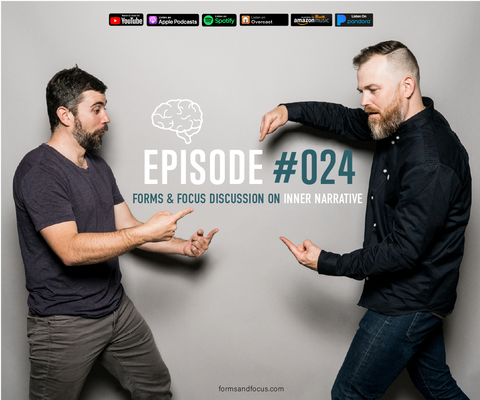
#24 Forms & Focus Discussion on Inner Narrative
FUCK YOU, INNER CRITIC
While your inner critic tries to keep you from dying, it is one of the main reasons you're not living.
Not everyone has an inner voice, but we all have an inner critic. Through evolution, parental guidance and cultural scripts, we have all been trained how to act, think and perform in a way that benefits others. As adults this leads to a battle between our inner critic and our inner nurturer. For many of us, the critic is winning.
On today's episode of the Forms and Focus Podcast (EPISODE #024), we are discussing focus and Inner Narrative. And what you can do TODAY to put your inner critic in its place, confide in your inner nurturer, and accomplish your dreams. Let’s dig in…
0:00 - Intro to Inner Narrative
0:38 - Podcast Intro
0:56 - Problem/Inner Narrative and how it impacts our focus.
8:54 - Solution/Habits for better focus.
WATCH THE EPISODE
SHOW NOTES FOR EPISODE #24
PROBLEM WITH INNER NARRATIVE AND FOCUS
What does science say about our inner narrative?
This may be shocking, but not everyone has an inner voice.
Researcher Mark Scott of the University of British Columbia found evidence that a brain signal called corollary discharge plays an important role in our experiences of internal speech.
Example: Corollary discharge is a kind of predictive signal generated by the brain that helps to explain, for example, why other people can tickle us but we can’t tickle ourselves. The signal predicts our own movements and effectively cancels out the tickle sensation.
He continues… “We spend a lot of time speaking and that can swamp our auditory system, making it difficult for us to hear other sounds when we are speaking, by attenuating the impact our own voice has on our hearing — using the ‘corollary discharge’ prediction — our hearing can remain sensitive to other sounds.”
Where Does the Inner Critic Come From?
Mia Baker explains in an article, “3 Reasons Your Inner Critic Doesn't Want to Leave Your Mind”
Evolution: The inner critic also induces a specific emotion that has evolutionary importance. That emotion is… shame. EXAMPLE: While our hunter-gatherer ancestors lived in tribes, shame informed them they might have done something that didn’t quite fit with the social norms and could threaten their position in the group.
Parental conditioning: Being overly critical, demanding, or ambitious — and through that, strengthening the kids’ inner critic. EXAMPLE: You get all As and one C and your parents criticize you.
Cultural scripts: There are cultural scripts that may have taught you to punish yourself for certain behaviors. EXAMPLE: “Big boys don’t cry.”
The Inner Critic and The Inner Nurturer
You also have your inner nurture, but your Inner Critic and Inner Nurturer uses two different parts of the brain!!
Beth Kurland in “How to Build Your Inner Nurturer” reviews a study that found when people experience self-criticism, the parts of the brain associated with increased monitoring of errors, punishment, and behavioral inhibition are activated. When people experience self-reassurance, the brain regions involved in expressing compassion toward others become active.
She goes on to say, “Despite many people thinking that being too easy on themselves will lead to them straying from their goals, extensive research shows that it is self-compassion, not self-criticism, that is the best motivator.”
Nathan Chandler in “Inner Speech Speaks Volumes About the Brain.”
“It does appear that biologically we all hear negativity louder than the positives. This is probably an adaption for survival. Our survival as a species was dependent on us hearing, “Watch out, there’s a snake”, while hearing “You are doing that well” was not so urgent.”
Examples Of The Inner Critic from Mayo Clinic: “Positive thinking: Stop negative self-talk to reduce stress.
Filtering. You magnify the negative aspects of a situation and filter out all the positive ones.
Personalizing. When something bad occurs, you automatically blame yourself.
Catastrophizing. You automatically anticipate the worst without facts that the worst will happen.
Blaming. You try to say someone else is responsible for what happened to you instead of yourself. In that same article from the Mayo Clinic, Negative self-talk will kill you.
How do we stand up to our inner critic?
- Rick Hanson, “How to stand up to your inner critic.”
- First, try to observe how self-criticism operates inside you.
- Be aware of anger at yourself that seems out of proportion to what happened. Listen to the tone in which you talk to yourself.
- Consider how self-critical attitudes developed inside you, perhaps when you were younger.
- When the inner critic starts pounding away, turn to your inner nurturer as a refuge and an ally.
- Imagine a “caring committee” inside yourself with different characters who represent various kinds of support and wisdom.
- As you go through your days, register when others see decency, capability, effort, and caring in you.
RESOURCES
- The War of Art by Steven Pressfield
- How Your Inner Critic Is Holding You Back | Melissa Ambrosini | TEDxMonashUniversity
- This talk isn’t very good. Dancing with my inner critic | Steve Chapman | TEDxRoyalTunbridgeWells
- Master Class, “Inner Critic: How Meditation Can Help Counter Your Inner Critic”
- Who Moved My Cheese?: An A-Mazing Way to Deal with Change in Your Work and in Your Life
WORKS CITED
Baker, Mia. “3 Reasons Your Inner Critic Doesn't Want to Leave Your Mind.” Big Self School, https://www.bigselfschool.com/post/3-reasons-your-inner-critic-persists. Accessed 10 April 2022.
Chandler, Nathan. “Inner Speech Speaks Volumes About the Brain – Association for Psychological Science – APS.” Association for Psychological Science, 16 July 2013, https://www.psychologicalscience.org/news/releases/internal-speech-is-driven-by-predictive-brain-signal.html. Accessed 10 April 2022.
Firestone, Lisa. “The Critical Inner Voice that Causes Depression.” Psychology Today, 28 September 2010, https://www.psychologytoday.com/us/blog/compassion-matters/201009/the-critical-inner-voice-causes-depression. Accessed 10 April 2022.
Fjelstad, Margalis. “More Questions About the Inner Critic.” Psychology Today, 22 November 2014, https://www.psychologytoday.com/us/blog/stop-caretaking-the-borderline-or-narcissist/201411/more-questions-about-the-inner-critic. Accessed 10 April 2022.
Hanson, Rick, et al. “How to stand up to your inner critic |.” TED Ideas, 18 May 2018, https://ideas.ted.com/how-to-stand-up-to-your-inner-critic/. Accessed 10 April 2022.
Kurland, Beth. “How To Build Your Inner Nurturer: 3 Strategies.” The Minds Journal, https://themindsjournal.com/inner-critic-vs-inner-nurturer/. Accessed 10 April 2022.
Mayo Clinic. “Positive thinking: Reduce stress by eliminating negative self-talk.” Mayo Clinic, 3 Feb 2022, https://www.mayoclinic.org/healthy-lifestyle/stress-management/in-depth/positive-thinking/art-20043950. Accessed 10 April 2022.

Comments (0)
There are no comments for this article. Be the first one to leave a message!